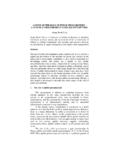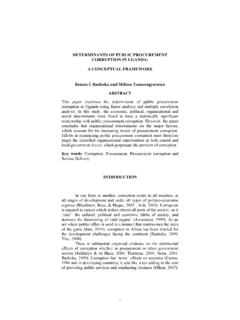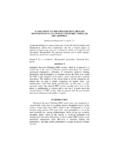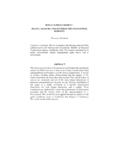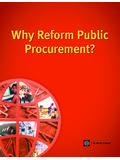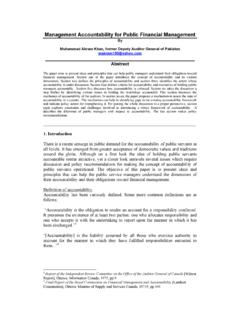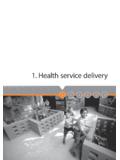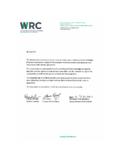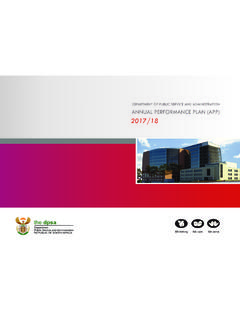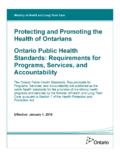Transcription of INTERNAL FACTORS AFFECTING PROCUREMENT PROCESS …
1 INTERNAL FACTORS AFFECTING PROCUREMENT PROCESS OF supplies IN THE public SECTOR; A SURVEY OF KENYA GOVERNMENT MINISTRIES John Karanja Ngugi and Hildah W. Mugo* ABSTRACT. Given the impact of PROCUREMENT activities on the operation and effectiveness of public sectors in Kenya, it is essential that these activities be performed by qualified staff with high professional and ethical standards and using sound procedures anchored in appropriate policies and regulations. The study adopted a descriptive research design to analyze the purchasing PROCESS in the Health-Care industry. The findings revealed that accountability, ICT adoption and ethics affected PROCUREMENT PROCESS of health care supplies in the public sector to a great extent.
2 The study therefore recommends that adequate controls should be put in place reducing opportunities for corruption. * John Karanja Ngugi, BCOM, MBA, MSC(ENTR), CPA (K), PhD finalist, is a lecturer, Jomo Kenyatta University Of Agriculture and Technology. His teaching and research interests are in PROCUREMENT , Accounting, Finance and Entrepreneurship. Hildah. W. Mugo is the Director Of Operations Equity Bank Limited. Her interests are in PROCUREMENT , Accounting, Finance and Entrepreneurship . Ngugi & Mugo 2314 INTRODUCTION PROCUREMENT is an important part of efficient drug management and supply and is critical for all levels of health care institutions.
3 An effective PROCUREMENT PROCESS ensures the availability of the right drugs in the right quantities, available at the right time, for the right patient and at reasonable prices, and at recognizable standards of quality (WHO 2007). Based on this document, are four main operational principles of drug quantification, registration, selection and efficient management. Thus, PROCUREMENT is not simply the act of buying but encompasses a complex range of operational, business, information technology, safety and risk management, and legal systems, all designed to address an institution s needs (Ombaka, 2009).
4 Specifically, management of medicines PROCUREMENT determine, accredit, and monitor appropriate supply sources; evaluate suppliers performance; choose a buying strategy or approach; monitor drug delivery; assess clinical and use outcomes; and evaluate new products and the drug market. Successful hospital PROCUREMENT is also a collaborative PROCESS , involving people with skills in purchasing, finance, management, clinical and nursing specialties, pharmacy, quality control, and even the end user: the patient. One of the basic rules of PROCUREMENT is that in the end, it is important to think in terms of the total cost of ownership.
5 This includes not only the purchase price, but also time and resources that are expended in the pursuit of the ownership. By understanding the steps involved with PROCUREMENT , it is possible to get a better understanding of the real cost involved with attaining any good or service (Baily et al 2004). Many public PROCUREMENT activities suffer from neglect, lack of direction, poor co-ordination, lack of open competition and transparency, differing levels of corruption and most importantly not having a cadre of trained and qualified PROCUREMENT specialists, who are competent to conduct and manage such procurements, in a professional, timely and cost effective manner.
6 Inflexible and bureaucratic systems of PROCUREMENT contribute to unacceptable contract delays, increased costs, the potential for manipulation of INTERNAL FACTORS AFFECTING PROCUREMENT PROCESS OF supplies IN THE public SECTOR 2315 contract awards and lack of fair competition, all of which create the perception in the population at large, that public expenditure is slow, ineffective, expensive and often corrupt. Information is critical to an effective and efficient PROCUREMENT PROCESS , on the other hand financing is the engine that drives it. In the case of Kenya for example, (World Bank 2007) ensuring adequate financing for the PROCUREMENT of pharmaceuticals remains an important part of medicines PROCUREMENT .
7 Pharmacists involved in hospital PROCUREMENT of medicines, whether directly or indirectly, must be knowledgeable about medicines as well as the interacting issues and the many stakeholders who can potentially affect the PROCESS or who may have legal responsibility. public PROCUREMENT has, for long, been overshadowed with inefficiency, corruption and disregard of fundamental "value for money" considerations. This has adversely impacted the rate and quality of progress in realizing the objectives of national development, especially in developing and transition countries.
8 Transparent management is another concept, which is closely related to accountability and Kenya leaves a lot to be desired in this facet. The idea behind transparency is that by actively disclosing information on how decisions are made, as well as measures of performance, we can improve public deliberation, reinforce accountability and inform citizen choice. In addition, transparency helps to document and disseminate information on the scope and consequences of corruption, information which can help build support for anti-corruption programmes and target enforcement efforts. PURPOSE OF THE STUDY The importance of public organizations as an entity designed to serve the public , along with the imperative for public accountability, makes studying the problems associated with the public sector essential (Trionfetti, 2000).
9 This paper is based on the interplay between the third and fourth group of activities. While apportioning blame on the generally disappointing economic performance of African countries since their Ngugi & Mugo 2316 independence, Kabaj (2003) succinctly argued that the failure to pay adequate attention to the proper management of public resources and the importance of establishing regulatory frameworks as a means to enhance investor confidence were the major culprits, in addition to the devastating effects of bribery and corruption on the productive use of resources ( ).
10 public PROCUREMENT systems are central to the effectiveness of development expenditure. Budgets get translated into services largely through the governments purchases of goods, services and works. It is estimated that 15% of the world s Gross Domestic Product (GDP) is spent through public PROCUREMENT (Development Assistance Committee, 2005). It is further estimated that public PROCUREMENT accounts for 9% 13% of the GDP of the economies of developing countries. In Angola, public PROCUREMENT accounts for 58%, it accounts for 40% in Malawi while in Uganda, it accounts for 70% of public spending (Thai, 2001).

